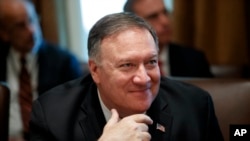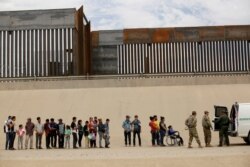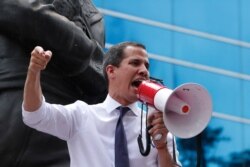This story was updated on July 18 at 11:35 AM
WASHINGTON — U.S. Secretary of State Mike Pompeo departed for Latin America Thursday to meet face to face with leaders there, amid difficult negotiations with Mexico and Central American countries over how to best stem the flow of migrants to the southern U.S. border.
“From July 19th to the 21st, the secretary will visit Buenos Aires, Argentina; Ecuador, Mexico City, San Salvador, where he will expand cooperation on security issues; reinforce U.S. commitment to human rights and democracy, particularly support for the people of Cuba, Nicaragua, and Venezuela, and their struggle for freedom; and to enhance economic partnerships and to expand economic opportunities for our citizens," State Department spokesperson Morgan Ortagus said during a press briefing on Tuesday.
Counterterrorism in Argentina
While in Argentina, Pompeo will participate in a counterterrorism conference with regional allies, timed to mark the 25th anniversary of the bombing of a Jewish center in Buenos Aires that killed 85 people, and has been linked to Hezbollah and Iran by Argentine prosecutors.
No one has ever been held accountable for the worst terrorist attack in Argentine history.
The White House released a statement marking the anniversary and highlighting Thursday's ministerial focused on counterterrorism cooperation.
"The United States and its partners throughout the Western Hemisphere will continue to take meaningful steps to ensure that our countries defend against the threat of terrorism and that we continue to do all that we can to protect our citizens," the White House said. "Through these efforts, we will more effectively identify and disrupt terrorist threats and networks around the world."
Stemming migration
Migration is likely to be a major issue at his other stops. Some experts say the United States must address the root causes, or “push factors” that are compelling people to flee their homes.
“You have to look at the lack of opportunity, the gang activity, the weak institutions in this region, in Central America if you are ever going to stop people from making what is a difficult and dangerous journey to the United States. These people don’t leave taking the decision lightly," Benjamin Gedan of the Wilson Center said.
He said there is broad consensus among most U.S. lawmakers that President Donald Trump should not have cut U.S. foreign aid to Guatemala, Honduras and El Salvador, while at the same time asking them to reduce the flow of migrants.
Other experts reject criticism of Trump for cutting aid to the so-called Northern Triangle countries.
“So I think the criticism of just, ‘Oh, the president is just making things worse.’ Well, honestly, really? Because how worse can things get?" asked James Carafano of the Heritage Foundation. "People are flooding north. It is obvious that money is not achieving anything.
"So if we're going to give them money, I think we have to come up with programs that are actually going to have impact," he added.
Venezuelan crisis
The ongoing crisis in Venezuela, where millions have fled to neighboring countries, is likely to be an important topic for Pompeo at every stop on his journey.
The U.S. and more than 50 other countries support opposition leader Juan Guaido as the country's leader.
Guaido contends President Nicolas Maduro's re-election last year was invalid and wants early presidential elections. Maduro accuses the opposition of fomenting violence.
Pompeo will also stop in Guayaquil, Ecuador and San Salvador, El Salvador, to deepen the U.S. relationship with those countries, according to the State Department.






